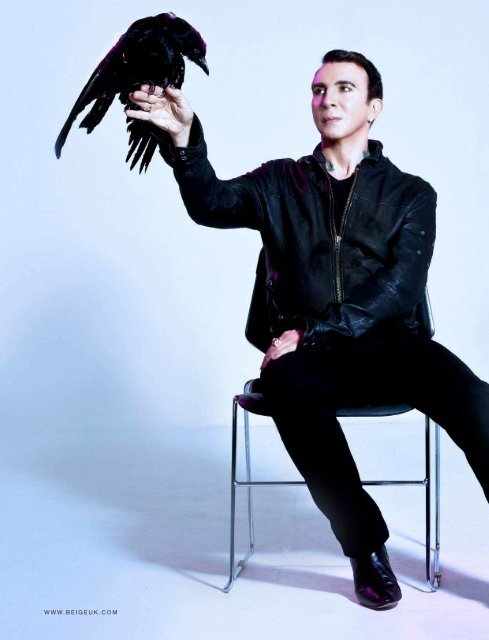Create successful ePaper yourself
Turn your PDF publications into a flip-book with our unique Google optimized e-Paper software.
MARC ALMOND<br />
I’m sitting in a top floor,<br />
white conservatory room<br />
overlooking central<br />
London. The space belongs<br />
to a mutual friend and<br />
will remain top secret.<br />
Why the secrecy?<br />
Well, this quiet sunny room contains<br />
one of the rarest artefacts from<br />
British 20th century pop music<br />
history: the original illuminated K<br />
WEST sign which once famously hung<br />
in Heddon St, directly above David<br />
Bowie’s “screwed down hairdo” on the<br />
cover of his legendary Ziggy Stardust<br />
album. This afternoon it shines down<br />
on another influential writer and<br />
performer, Marc Almond, a star every<br />
bit as iconic as Ziggy’s surviving street<br />
sign, but far more illuminating.<br />
I have been fortunate to see Marc<br />
perform twice recently. First, when he<br />
celebrated his 55th birthday at The<br />
Shepherd’s Bush Empire, taking us<br />
on a personal musical journey before<br />
launching into an energetic, floor<br />
shaking Northern Soul finale. Then<br />
a month later, by startling contrast,<br />
at the Royal Festival Hall, where he<br />
enthralled the entire audience with<br />
a staggering orchestral performance<br />
of his seminal Marc and the Mambas<br />
album, the epic Torment and Toreros.<br />
Today he is relaxing and in a reflective<br />
mood. I wondered if there had been<br />
any highlights during his incredible<br />
career. “That’s really hard to say,<br />
there are so many,” he answers,<br />
sipping a cup of green tea. “The fact<br />
I’m still here is remarkable! My initial<br />
success in the 80s was of course a<br />
highlight, but I don’t dwell on that<br />
time too much because although it was<br />
fantastic it was also a double edged<br />
sword. I really wasn’t prepared for<br />
success. Soft Cell were formed when<br />
I was studying performance art at<br />
college. We never intended going into<br />
pop music, we were an experimental<br />
electronic underground band, so being<br />
thrust into the limelight on Top of The<br />
Pops was scary.”<br />
BY MARTIN GREEN<br />
WWW.BEIGEUK.COM 07 BEIGE<br />
PHOTOGRAPHY: CLAIRE LAWRIE GROOMING: GOZRA LOZANO<br />
Marc admits that he struggled with<br />
self confidence back then. “I had a<br />
terrible stammer, ADHD and some<br />
learning difficulties, which didn’t<br />
help my social skills, so when success<br />
happened I couldn’t connect with<br />
people in the mainstream world.<br />
Something really magical and<br />
fantastic happened to me then and I<br />
wish I could have appreciated it more.<br />
Another highlight from that period<br />
was meeting Andy Warhol, Klaus<br />
Nomi and all the artists who were<br />
hanging out in New York. The edgy<br />
downtown scene there was incredible<br />
in the early 80s. It was a vibrantly<br />
dark time.”<br />
Marc is incredibly resilient. The<br />
‘Boy Who Came Back’ grew up in<br />
Southport, experiencing a tough,<br />
abusive life with an alcoholic father<br />
and persistent school bullying. “My<br />
early education was a survival course.<br />
I was ideal bullying material being<br />
intelligent, creative and artistic. At<br />
the same time home life was difficult.<br />
My drunken father would come to my<br />
class and, in front of everyone, ask the<br />
teacher if I was a homosexual. It was<br />
humiliating. To fight back I became<br />
disruptive, that way people would<br />
think I was brave. At the same time<br />
I was forming obsessive friendships<br />
with boys, but I wasn’t being very<br />
subtle about it. My overt flirtations<br />
would often attract the willing and the<br />
curious.”<br />
The early 1970s was an exceptional<br />
period of gay liberation and glam<br />
revolution. T- Rex and Slade excited<br />
the young dude but David Bowie<br />
really blew his mind. “No other artist<br />
sent me on so many musical journeys<br />
of discovery. He was my education.<br />
I learnt about Jacques Brel, Lou<br />
Reed, and Jean Genet. I could escape<br />
from my grim surroundings into his<br />
inspiring universe. In those days of<br />
pre-internet, I’d travel to Liverpool<br />
to seek out books by Genet and<br />
Burroughs and records by Iggy Pop<br />
and Jobriath, all because Bowie liked<br />
them. I also went to see his mentor,<br />
the choreographer, Lindsay Kemp<br />
perform, which was amazing. Bowie<br />
created life long passions in me.”



